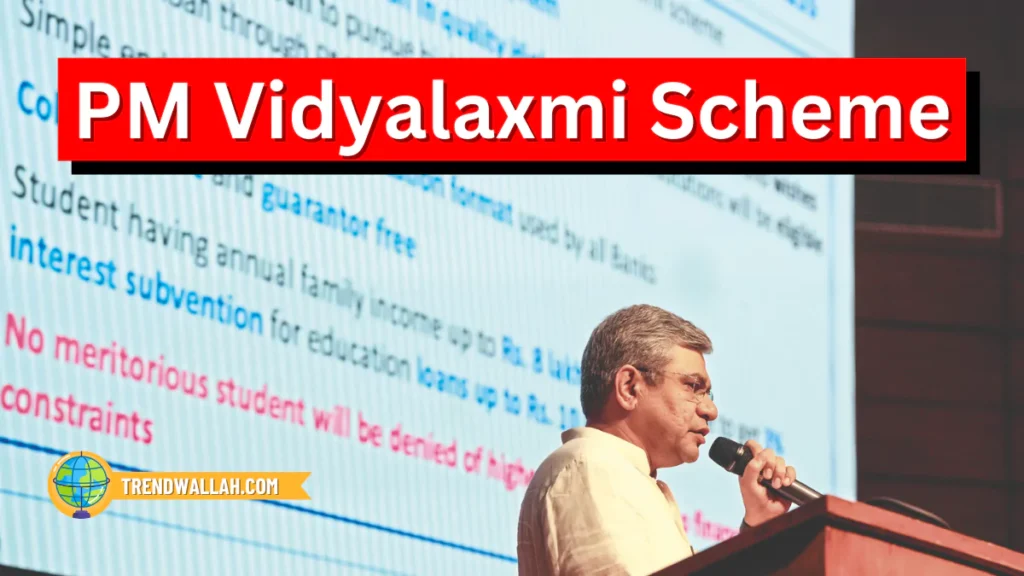
The Union Cabinet, led by Prime Minister Narendra Modi, approved the PM Vidyalaxmi scheme on November 6, 2024. This scheme aims to provide collateral-free and guarantor-free loans to students pursuing higher education at top-ranked institutions across India. With a budget allocation of ₹3,600 crore, the initiative is expected to support around 22 lakh students annually, helping them overcome financial barriers to higher education.
Key Features of the PM Vidyalaxmi Scheme
Eligibility and Loan Coverage in PM Vidyalaxmi Scheme
Students admitted to the top 860 Quality Higher Education Institutions (QHEIs) based on National Institutional Ranking Framework (NIRF) rankings, including central and state institutions, can avail themselves of this scheme. The loan covers tuition fees and other course-related expenses, ensuring full support for eligible students.
Loan Amount and Credit Guarantee
Under the scheme, students can apply for loans of up to ₹7.5 lakh, with a 75% credit guarantee on defaults, giving financial institutions added security for loan distribution.
Interest Subvention
The PM Vidyalaxmi scheme offers a 3% interest subvention on loans up to ₹10 lakh for students with a family income below ₹8 lakh per annum. The interest subsidy applies during the moratorium period, allowing eligible students to complete their education without financial stress.
Targeted Beneficiaries
This scheme prioritizes students pursuing professional and technical courses in government institutions. It aims to benefit 7 lakh new students annually, with 1 lakh receiving the interest subvention.
Digital Platform for Easy Access
The PM Vidyalaxmi portal will provide a streamlined application process, where students can apply for loans and interest subvention. The portal connects with all banks and supports e-voucher and CBDC wallet payments, simplifying loan applications.
Universalising access to 21st century higher education for India’s talented youth is PM Modi’s guarantee.
— Dharmendra Pradhan (@dpradhanbjp) November 6, 2024
Hon’ble PM @narendramodi ji’s approval to #PMVidyalaxmi with an outlay of ₹3,600 crore will remove obstacles to higher education and enable our yuva shakti to pursue their… pic.twitter.com/EYXo2xH8Bx
Supporting India’s Education Mission
Aligned with the National Education Policy 2020, the PM Vidyalaxmi scheme focuses on making higher education accessible to deserving students from underprivileged backgrounds. Union Education Minister Dharmendra Pradhan highlighted this scheme’s role in empowering India’s youth to achieve their educational goals.
| Feature | Details |
| Loan Type | Collateral-free, guarantor-free |
| Eligible Institutions | Top 860 QHEIs based on NIRF rankings |
| Loan Amount | Up to ₹7.5 lakh |
| Interest Subvention | 3% for family income below ₹8 lakh |
| Targeted Beneficiaries | Students in technical/professional courses, govt. institutions |
| Unified Portal | PM Vidyalaxmi portal for applications and payments |
PM Vidyalaxmi Scheme Summary
- Union Cabinet approves PM Vidyalaxmi scheme for financial aid in higher education.
- Scheme provides collateral-free loans for students in top-ranked institutions.
- Eligible students can receive loans up to ₹7.5 lakh with a 75% credit guarantee.
- Interest subvention of 3% for loans up to ₹10 lakh for low-income families.
- PM Vidyalaxmi portal offers a streamlined application process for students.
- Initiative supports National Education Policy 2020 for accessible education.
Also Read Latest Current Affairs 2024
| Mandeep Jangra Wins World Boxing Federation Super Featherweight Title | Indian Army Inducts 550 Asmi Machine Pistols in Northern Command |
FAQs
The scheme offers collateral-free loans to students pursuing higher education in top-ranked institutions in India.
Students admitted to the top 860 Quality Higher Education Institutions (QHEIs), as per NIRF rankings, are eligible.
Students can avail loans up to ₹7.5 lakh under this scheme.
Yes, eligible students with a family income under ₹8 lakh can get a 3% interest subvention on loans up to ₹10 lakh.
The portal streamlines loan and interest subvention applications, connecting all banks for seamless access.
The Department of Higher Education under the Ministry of Education will implement the scheme.
The scheme aims to make higher education accessible to meritorious students, especially those from lower-income backgrounds.

